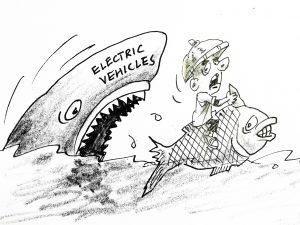The rapid rise of electric vehicle (EV) production worldwide signals a significant shift in the automotive industry, which could spell trouble for gasoline-powered vehicles, especially in countries like the Philippines where most car owners rely on traditional combustion engines. While the push toward electrification is a necessary step in addressing climate change, it raises valid concerns for many Filipino car owners whose investments in gasoline cars might become obsolete.
Gasoline-powered vehicles, which make up the majority of the country’s car population, are not cheap investments. Many Filipinos save for years to afford a vehicle, often relying on it for both personal and business purposes. The shift to electric vehicles (EVs) and the potential phase-out of gasoline cars would essentially devalue these assets, rendering many of them useless in the coming years. This looming threat creates uncertainty and financial strain on middle-class Filipinos who may not have the means to switch to the more expensive EV alternatives.
Noticeably, the infrastructure required for electric cars is not yet widespread in the Philippines. Charging stations, electric grids, and proper maintenance facilities are still in their infancy stages, making the adoption of EVs a difficult prospect. This stark difference from countries with robust EV support systems could lead to a prolonged period where gasoline cars are still necessary for daily life in the Philippines. Forcing a transition before adequate infrastructure is in place could exacerbate the existing inequality between those who can afford to adapt and those who are left behind.
Environmental concerns are also worth considering in the local context. While electric cars promise to reduce emissions globally, the Philippines still relies heavily on coal and fossil fuels for electricity generation. Thus, a sudden surge in EV adoption might not provide the same environmental benefits in the country as it does in nations with cleaner energy sources. Pushing gasoline cars out of the market without addressing the root causes of pollution—like energy production—could divert attention from more pressing issues.
To avoid leaving Filipino car owners at a disadvantage, the government should focus on creating a balanced transition strategy. Policies should include a reasonable timeline for phasing out gasoline cars, allowing car owners to maximize the remaining value of their vehicles. Offering subsidies or trade-in programs could help offset the costs of transitioning to EVs, ensuring that the shift is equitable and inclusive. Additionally, ramping up investments in infrastructure and renewable energy would ensure that when the time comes, the country is ready to embrace EVs on a larger scale.
This trend toward electric vehicles must be approached with caution in the Philippines, where gasoline cars remain dominant. Filipino car owners should not be punished for the investments they’ve made in gasoline vehicles, and the transition should be managed thoughtfully to avoid unnecessary financial burdens. A gradual, well-planned phase-out coupled with infrastructure improvements and support systems is the best way forward to ensure a fair and sustainable shift toward electric mobility.




